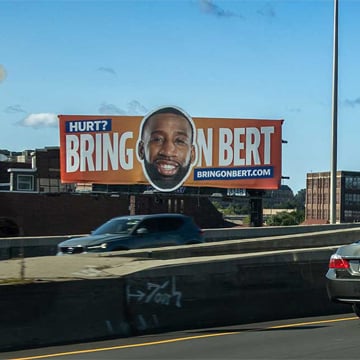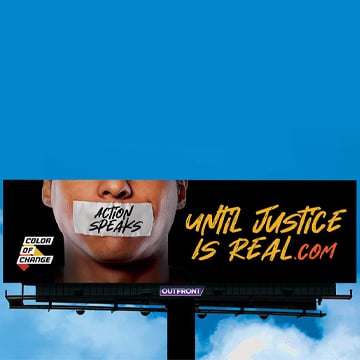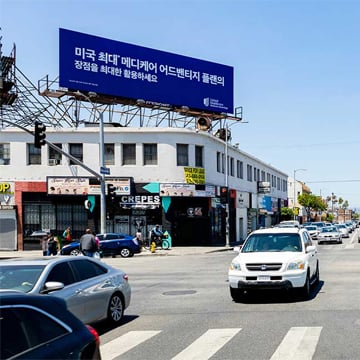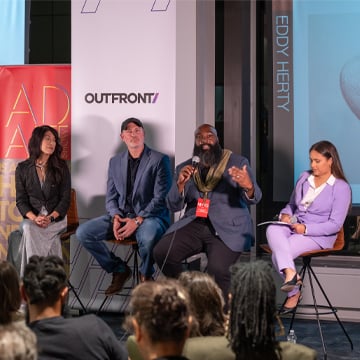
OUTFRONT x Ad Age Panel Celebrating Black Creative Excellence Closes Out Black History Month
March 6, 2025
The Black History Month partnership between OUTFRONT and Ad Age is all about uplifting Black voices. That’s why we wrapped up the third year of our Celebrating Black Creative Excellence campaign by hosting an all-star panel of Black creative leaders who spoke on mentorship, representation, and the challenges Black creatives face in today’s turbulent atmosphere.
Sabrina Sanchez, senior creative reporter at Ad Age, moderated the panel. On that panel were Gary Coichy, Founder & CEO, Pod Digital Media, Datwon Thomas, Executive Producer, Dick Clark Productions and Editor at Large, Vibe Magazine, Nadja Bellan-White, CEO, M&C Saatchi Group North America, and Shannon Bergeron, Senior Art Director, OUTFRONT STUDIOS. Here’s what they had to say.
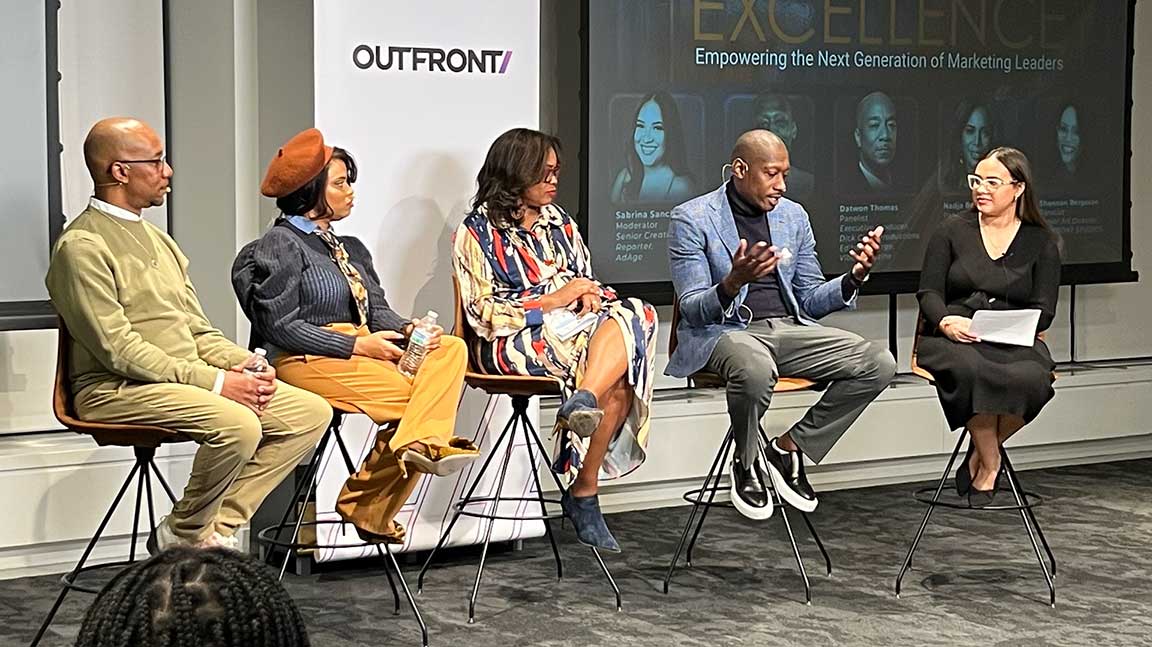
On leadership and listening
Nadja: First, you actually have to have some black creatives within your organization, but you’ve got to give them the safe space to speak, right? I think one of the hardest things I've seen in many of the networks I've worked in all of them is they just weren't heard. That’s what's being an ally is, giving them space to be heard, and being their advocate in the room, whether or not they're even there. And the worst thing for any creative is not even getting a chance to be heard. So be an ally. Open up the door, give that person a chance, mentor them from afar, speak up for them even when they're not in the room, and give them the opportunity. That's what being an ally is. And please, just don't do it in Black History Month, right? Do it every damn day, right? That's what being an ally is. Don't relegate it to a month, a day, or whatever. It's just part of your day-to-day practice.
Gary: “You can’t be what you can't see, right? My relationship with Ad Age goes back to 2019, but in 2020 specifically when George Floyd happened, my publicist at the time calls me, he goes, ‘Gary, this is your moment. You have to own it. You represent Black voices. You need to write a letter to the advertising community and say, this is what brands need to do to support, Black creatives and Black voices.’ So I wrote the letter to our brand partners and also to the industry, Ad Age picked it up, they published it, and I was brought on board for an interview. And that interview actually garnered us a lot more clients. I can certainly say that has certainly elevated business from 2020 to where we're currently at right now in 2025. So that being said, the same way we saw, I personally saw that, it was a crisis and we saw this as an opportunity.”
“We have to take this moment also as an opportunity to sort of to educate the masses, right? Panels like this, conversations that we're having on our pitches, conversations that we're having at the agencies, conversations we're having at the brands. We can't teach courage, right? Because at the end of the day, they still have to do the work.”
Datwon: “That's leadership basically, that's what can open the doors – someone saying ‘we know what the normal is, but this is what the right is,’ to be able to usher in new ideas from people that might not feel like their voices are being heard. One thing that really sticks out is the number of interns that I've helped go to the next level because I opened the floor to them. Even if I had my actual staff there, the interns had a voice. And if we're not listening to the youth or opening up the floor for them, you're not going to get that new idea. A lot of times you're actually going to be the old person in the room looking at old ideas. There were so many times where someone that you would never think will have like this incredible idea, but they were so afraid to say something. I think fear cripples companies. I mean truly cripples them. The fear cripples people from even being able to say something when they know what's wrong. And that's what happens a lot of times when leadership is a little too rigid and they don't allow for people to be able to speak their minds.”
On mentoring the next generation
Shannon: “Offer honest insight and industry knowledge. A lot of Black creatives, young Black creatives don't have that. They don't have the connections in the industry when they're first starting out. So just being there and teaching them the ropes basically will really help. And advocating for these young black creatives as well, because there are spaces that they can be in where they don't see representation in their leadership. And so they start to feel like, oh, I don't belong here, or how is my upward mobility going to even happen? Because I don't see myself in that role.”
Nadja: “So it's really hard for black creatives. I've been in this industry for 30 years. It is a problem everywhere. And it does start with the pipeline. You have to be willing to recruit. You want to get the pipeline of talent in so that young black creatives know that there is a path for success. And I think our collective responsibility being in this industry is to create a path for others to come in, invite them to be on the pitch, or give them that little bit of advice. Because you can have a very long career in this industry. But if no one's willing to open up the door for you or show you the way, or it could be a short one too. But there is no quick way towards success. Let's be very clear. There's no shortcut to learning how to write. You can't AI, ChatGPT your way out of learning how to write. There's fundamental skills you need in order to write. And you know what? I'm not a creative, but craft is important. Again, you can't ChatGPT your way through craft. There are certain fundamental skills you must have. It takes time. You also have to be willing to do exactly what many of us did up here and it did not happen overnight.”
Shannon: “I started in this industry when I was 19 and I was young, green and I really didn't know anything about working in corporate America. So I really didn't even have a mentor. It was “fail fast” and there were some mistakes that were made along the way, but that just comes with not having someone in place to help you in that role. So I decided from then, I knew that, it was hard for me, so I didn't want to make it hard for the next person. I wanted to help them out in any way that I could. So if that was being an advocate for them, just helping them out and making them feel like they belong, I was willing to do that. As my career evolved into a leadership/managerial role, I said, OK, I need to be an advocate for these young Black creators because I was privy to some conversations that were had where it was very veiled that management felt a certain way. And so I was like, OK, now it's time for me to be their protector because I didn't have that. So that's pretty much how I got into it. And that's why I'm so passionate about being a mentor to young black creators because I didn't have that. There was no buffer for me. I just had to take it.”

On present distress and future hope
Nadja: “I'm part of the CMO Alliance and part of AD Council, but in BECA, the Black Executive CMO Alliance, we talk about this constantly. Everybody in this particular organization are all C-Suite and everyone's under attack. People are being fired for not the right reasons, and we all know why. But that does not mean our commitment to mentoring young people of color has changed or has wavered. And yes, we are under attack. I am under attack constantly, always being questioned, always being undermined, always the why, why, why, why. That does not stop no matter whether you're at junior level or at the senior level. But the key is one thing that was unequivocal about what we said is our commitment to mentoring young people does not change. Because I actually think now more than ever, they need support and guidance for someone to say, what do I do now? Because for some, we're in uncharted times.”
Gary: “This moment also calls for us to provide even additional knowledge as to how the landscape, five, ten years from now, this country will be much more diverse than it is right now. So if you're not making that decision right now, then that means you don't have a business in five to ten years because you're not actually building and curating the right audience out that would be purchasing a product.”
Datwon: Kids between the ages of 15 to 18 are like, what do I do? What's next? They're wondering what's next for them in the scope of careers. And because of what's happening in America right now, it's making them think differently from the creative arts. That hurt my heart so much. I was just trying to let them know, don't let the fear of what's going on hurt because yes, it's four years of craziness that we have to go through. But like Gary said, it's going to look so different when they're actually going to be in the workforce. When you start to break it down that way and they start to understand it that way, they're like, oh, wait a minute. So my dream isn't over.
Nadja: “Or you use the strife. You know, if you talk to artists and real creatives, out of adversity comes opportunity. If you think of every kind of revolution that's ever happened, particularly in the arts, it comes out of the greatest amount of strife. So I would argue for those that are in the more creative industry, whatever is happening right now around the world to actually inspire something new, something different. Certainly with the impact of technology, there's probably an opportunity to reinvent yourself in new industries that perhaps none of us have even thought of before.”
On the importance of celebrating Blackness and Black culture
Shannon: “A former employee mentioned how when we worked together, he noticed how other employees wouldn't put Black stock photography in their creative because they just didn't see themselves in that space. So he would purposely put black photos in his designs. And there were businesses like, Oh no, take them out and put someone else. And it was just sad. After he left, he decided that he wanted to start doing stock photography that features Black people. So that was just a major thing for him. He was inspired out of that adversity to just go ahead and make the space for himself.”
Nadja: “But I would argue that some Black creatives don't even want to be seen as just Black creatives. They want to be known as just the best, the most creative. I hear that a lot. ‘Don't pigeonhole me in a box because my aperture is far wider than what you're going to limit me to be.’ So we give them opportunity to be at the table with everyone else and give them opportunity to work on that production, to work on that TV spot, to work on that print and that experiential, that digital experience. And don't put them in a box saying you're only going to work on what I decide is multicultural when all of it really is of the culture.”
Datwon: “I think one of the things is because of the benchmarks that we have for greatness, you know, it's the Oscars, it's the GRAMMYs, it's that. And if we aren't included in the nominations, then it feels like, OK, you're only great for NAACP and those type of things. So it's also like, how much acceptance do we want from others? And you said for us to give ourselves flowers.”
Gary: “So I think on our end as leaders and CEOs of these platforms that currently exist, we do have a role to play to see each other as partners, as collaborators, which is seeing each other as competitors, right? Because that creates the space not only for us to actually now be able to sort of even create emerging platforms as a unit, but also the younger generation are watching us, They're paying attention. And then now they're seeing it because you can't be what you can't see.
On getting representation right
Datwon: “When I saw that commercial with Snoop Dogg where he’s berating Kai Cenat because he dropped his phone and broke it. And it's just real stereotypical in a way. It was almost condescending. For such a huge talent like that, there could have been a better storyline. This is a young Black kid from the Bronx with locs that's connected to Caribbean culture. There's a lot of ways that they could have told that story, especially with Snoop, different things that could have been a teachable moment for mainstream America. They chose a route that seemed a little demeaning. And I think what needs to happen is someone needs to have that spectrum eye to say, hey, you know what, this might hurt an audience or it might speak down to a certain audience…”
Nadja: “It speaks to a lack of representation. But it rots in the head down. I mean, because you got to look at who's represented on boards, then you got to look at who's really making the decisions. I mean, the truth is oftentimes people are frustrated at the CMOs and the people who are actually signing the contracts. You got to look at what the business imperative is at the very, very top and the commitment has to be at the top. And if it's not there, what you get is a watered-down effect and what the output is, it's oftentimes ineffective.”
Gary: I'm also a huge advocate of, it's never what you do, it's how you do it, right? So it's just certainly again, the data points or using examples where someone may have been cancelled for the same exact same reason and say, ‘Look, this is what they did.’ These are the tweets from some important people and this is how the ad make them feel. Moving forward, this is actually how we should optimize it and make sure we are pushing a different manner.
Nadja: “I'll be the first to say that's not going to work. We're not running it. I don't know what everybody else does, but you got to call it out. At every level you have to call it real.”
“When I was a young VP, I was in a brainstorm with and agency and they showed an ad for Vaseline and it was a Black woman. And it said, ‘finally I feel comfortable in my own skin.’ And they were like, ‘isn't this amazing?’ As the only person of color, I was looking around like ‘You've got to be kidding me. Did you guys think this is good?’ They truly did not know what they did wrong. Finally I explained it to them. But had I not spoken up, they would have been at a far worse situation. So the point is you got to speak up. You just have to. You got to pull someone aside, pull them up and say, ‘listen, unless you want to be cancelled completely, do not do this.’”
On why DEI improves the bottom line
Nadja: “I think there is a lack of bravery that exists in the market today…Let's be very clear. Being inclusive has always been all about the business. And I don't think they are mutually exclusive. Being and having the most inclusive organization, making sure you market to a wide swath of visuals, should not be based on a DEI agenda. It should be based on a business agenda. This idea that it is a box that you tick, that somehow it has an impact on the level of excellence you have an organization, quite frankly is bullshit.”
Gary: “We have to educate marketers and partners of brand advertisers that DEI and multicultural are related and connected, but they are very different. DEI is more about an internal practice to ensure that your workforce is very inclusive; multicultural is ensuring that you can reach growth audiences.”
“If you're trying to reach a Hispanic LGBTQ audience because they purchase your product, however, internally on your team, there is no one of Hispanic descent from the LGBTQ community, guess what? The content and the creative that you are pushing out will not resonate with that audience that you're trying to reach. Which is why it's important to ensure that DEI is a part of your approach internally so that your multicultural, inclusive, cultural marketing can actually deliver results.”
Author: Jay Fenster, Marketing Manager @ OUTFRONT
Links to third-party content are not endorsed by OUTFRONT Media. Past performance may not be indicative of future results. OUTFRONT does not guarantee specific results or outcomes.
